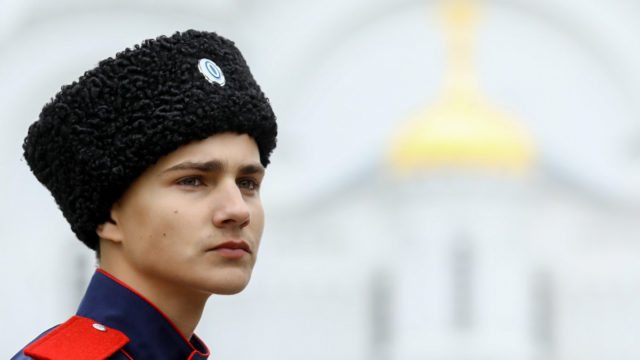
Russia’s Cossacks Battle Coronavirus and Promote Kremlin’s Foreign Policy
Publication: Eurasia Daily Monitor Volume: 17 Issue: 35
By:

As fears of the COVID-19 pandemic grip much of Russia, the country’s Cossacks have been enlisted to help contain the deadly virus. In the city of Ekaterinburg, Ataman Gennady Kovalev of the Ural Cossacks announced biweekly patrols in the Seven Keys region of the city, which began on February 2. Seven Keys is an area where Chinese immigrants traditionally live. According to reports, the patrols identify those who have symptoms similar to those for COVID-19 and strongly advise them to go to hospital, as well as distribute protective masks. Russia has also closed its borders to Chinese citizens in an effort to contain the virus (Novye Izvestiia, February 19). More mundanely, the council of Cossack Atamans under the Russian president issued an edict not to kiss the icon or touch the hands of priests due to the threat of coronavirus. Ataman Gennady Kovalev said, “It is an official order from our organization [the council of Atamans of regional Cossack organizations]. It is forbidden to kiss icons or touch anything relating to mass worship. Fighting the virus, which spreads through touch and airborne droplets, necessitates this. Our task is to warn that [these practices] are dangerous and contribute to the spread of infection” (Kasparov.ru, March 2). Official Russian figures for coronavirus are suspiciously low, with not many more than 50 cases reported across the country as of mid-March, in comparison to the thousands in Italy, France and the United States (Coronavirus-online.ru, March 17). This is despite the fact that “community spread” should presumably be much easier in Russian cities due to Russians’ widespread reliance on mass transit compared to much of the US, for example. While no country has a stellar record of providing adequate information—or even sufficient testing—about the threat of COVID-19, political imperatives are likely contributing to the low reported numbers from Russia, for now. Still, the Cossacks have once again been put on the front lines, this time to fight the global pandemic, in addition to their previous roles in defending Russia against other perceived international threats.
In occupied Crimea, the Cossacks have become a central component of socializing the youth in furtherance of the objectives of the Russian state. Indeed, the Cossack constituent krug (circle) in Simferopol declared the creation of the “Black Sea Cossack host”—a reference to the 18th century Cossack formation that was liquidated by Catherine the Great. Commentating on the pro-Russian site Crimea Information (Crimeanform), Anton Sirotkina explained that “currently the number of Cossacks in the Black Sea Cossack host is over 5,000. But this is far from the ultimate potential. I estimate that [potential] as not less than 10,000 Cossacks in the short term with the full activity of the Black Sea Cossack army.” According to the Russian-appointed governor of Crimea, Sergei Aksenova, the Cossack host will help the Russian security services maintain social order on the peninsula. Some of the Cossack organizations that are currently in Crimea played an important role in the 2014 annexation (Krym.Realii, January 18). While it is far from clear whether the Cossacks in Crimea will play a similar role as those in Ekaterinburg in protecting society against the threat of COVID-19, the Cossacks—many of whom were from Krasnodar and Rostov and were ferried over on boats during the annexation—have been used by the Russian state in pursuit of foreign policy goals. At a January 2020 roundtable on the subject, Ukrainian historian Taras Chukhlibom claimed that “there are nearly 50 social organizations of Cossacks who are active in Crimea today, but Russian special forces control them and they have no historical traditions.” Roundtable journalist Elenoi Litsenko noted that during the annexation the “Cossacks” (some of whom were simply dressed up as such) played a public role when the military was trying to maintain the appearance of being simply “polite people” (Krym.Realii, January 7). While it is of course no revelation that the Russian state has used the Cossacks to help fulfill various foreign policy objectives, there are recent signs of that process intensifying.
In November of last year, the Ryazan Cossacks, with the support of the Russian Cossack council under the president, claimed that the Baltic States of Lithuania and Estonia should be returned to Russia. They claimed that “according to the terms of the Nishtadsk Peace of 1721, the (then-existing) Kingdom of Sweden officially transferred the conquered areas of Livonia and Estonia with the cities of Revel (Tallinn) and Riga to the Russian Empire. We recommend that you consider the elimination of the current state entities there and return them to the Russia state as the Livonia and Estland provinces” (Zen.yandex, November 17, 2019). Such a demand seems patently absurd on its face, and it may have been extended in retaliation for suggestions from the Estonian and Lithuanian governments that they receive restitution from Moscow for the period of Soviet occupation. Still, given the record of the Russian government employing the Cossacks in foreign affairs—as well as a history of trial ballooning eccentric ideas to measure their appeal prior to undertaking special operations—such a development should not be entirely ignored out of hand.



